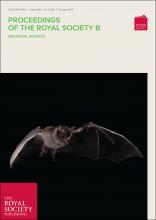 A 13th retraction has been published for Jesús Ángel Lemus, the Spanish veterinary researcher whose work colleagues have had trouble verifying.
A 13th retraction has been published for Jesús Ángel Lemus, the Spanish veterinary researcher whose work colleagues have had trouble verifying.
This paper was pulled for similar reasons as his other retractions: After retrying the experiments in two independent labs, fellow authors were “unable to arrive to any sound conclusion about the validity of his analyses.”
Proceedings of the Royal Society B: Biological Sciences posted the notice September 16, three years after the paper received an expression of concern.
The retraction notice, signed by every co-author but Lemus, reads:
In September 2012, we alerted Proceedings of the Royal Society B: Biological Sciences about the validity of the laboratory analyses carried out by Jesús A. Lemus published in the article ‘An island paradigm on the mainland: host population fragmentation impairs the community of avian pathogens’.
After careful examination, partial replication of the laboratory analyses to assess the validity of our results, and as confirmed by the Ethics Committee of the Consejo Superior de Investigaciones Científicas (CSIC) on 25 July 2012, there is a need to question the validity of the laboratory analyses conducted by J. A. Lemus in the above article. We replicated molecular analyses of all available samples (ca one-third of the original samples) in two independent laboratories, but the results did not yield repeatable values between laboratories. J. A. Lemus received blinded samples and consequently had no information about the individuals analysed, or the characteristics of their population at any moment of the analyses. However, and despite our additional efforts, we are unable to arrive to any sound conclusion about the validity of his analyses.
For all the reasons explained, we wish to retract this published article.
The 2011 paper examined how diseases spread among birds. The authors found “that severe habitat loss and fragmentation could lower pathogen pressure in small populations,” according to the abstract.
It has been cited six times, according to Thomson Scientific’s Web of Knowledge.
The journal’s editor-in-chief, Spencer Barrett, said in a statement that the retraction was carried out according to guidelines by the Committee on Publication Ethics (COPE):
Following publication of the original article (http://rspb.royalsocietypublishing.org/content/278/1718/2668) in Proceedings B on 26th January 2011, it was brought to the journal’s attention by several of the authors that they had concerns regarding some of the data based on laboratory analyses included in the paper. An expression of concern was published (http://rspb.royalsocietypublishing.org/content/279/1745/4304) on 22nd August 2012 to highlight this concern to readers while the authors and their institution investigated further. Proceedings B is a member of COPE, and this process is in line with COPE guidance on such issues. Following the authors’ and the institution’s investigation, and in discussion with the authors, the decision was taken to retract the article and a retraction was published (http://rspb.royalsocietypublishing.org/content/282/1815/20152004) on 16th September 2015.
Corresponding author Matthias Vögeli at the Federal Office for the Environment in Switzerland said that the retraction told the whole story:
The retraction notice published 16 September 2015 resumes all the important information regarding this issue.
In 2012, another paper by Lemus was retracted from Proceedings of the Royal Society B: Biological Sciences over questions about Lemus’s analyses; he has also been the subject of an inquiry by the CSIC that investigated concerns that he had fabricated data and created a ghost author, Javier Grande.
Like Retraction Watch? Consider making a tax-deductible contribution to support our growth. You can also follow us on Twitter, like us on Facebook, add us to your RSS reader, and sign up on our homepage for an email every time there’s a new post. Click here to review our Comments Policy.